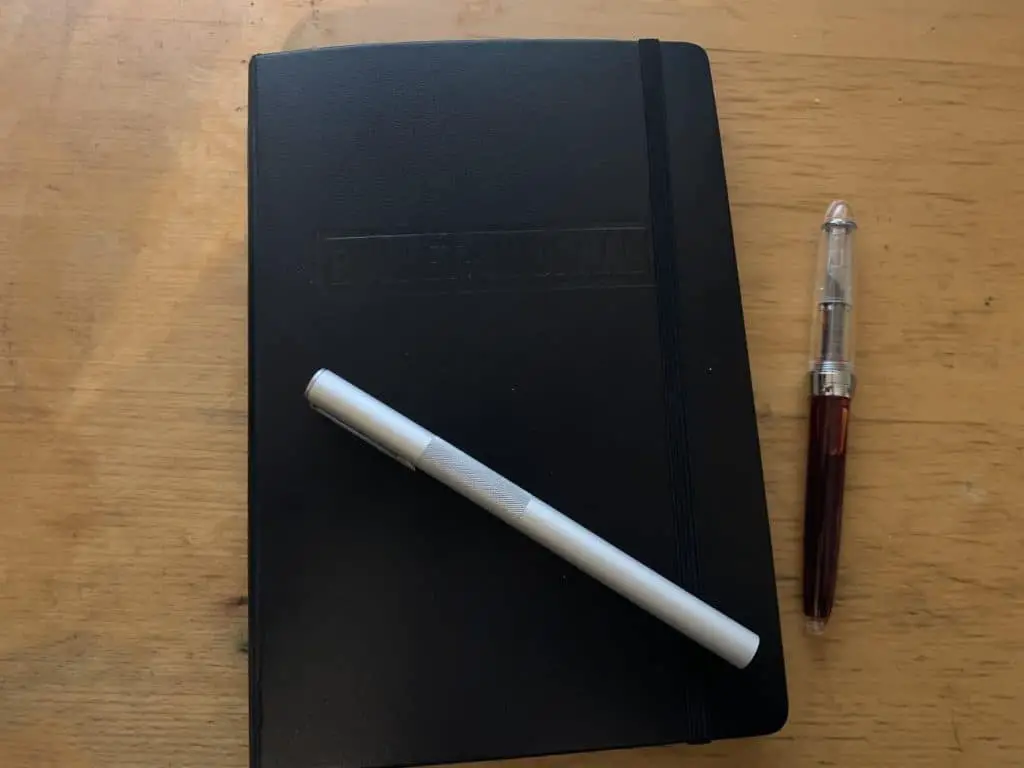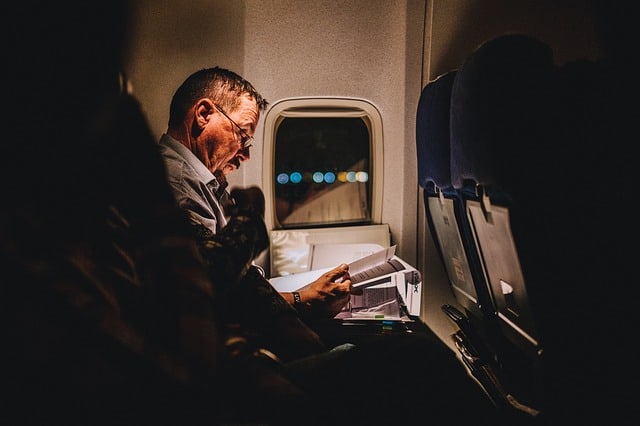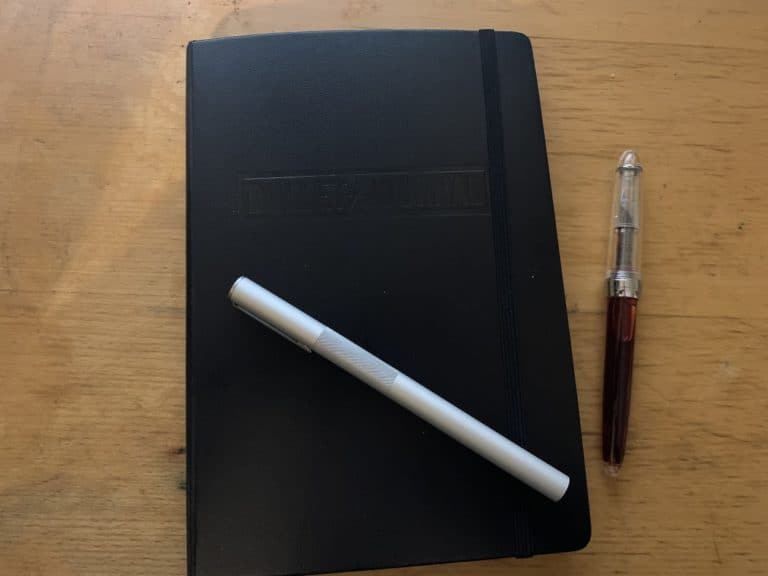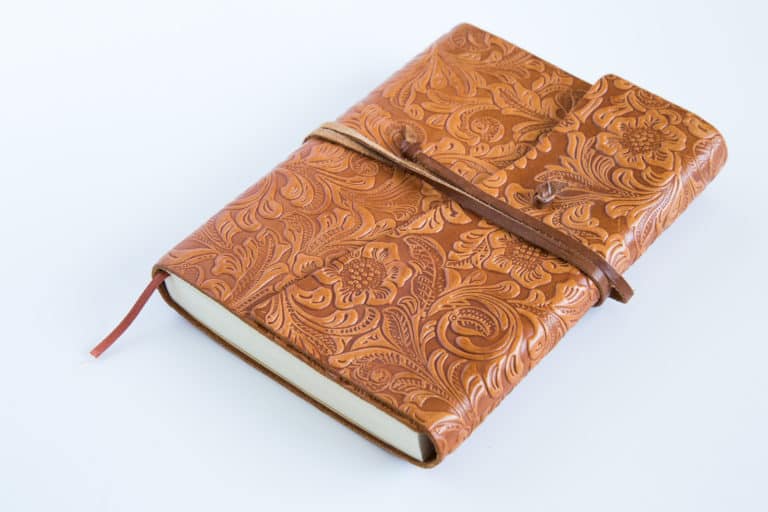Can You Bring Journaling Items on a Plane?
You might be surprised by how many people journal consistently, whenever time allows, like while sitting in lines or on buses, trains, or airplanes. Of course, the major transportation modes have stringent safety regulations nowadays, so if you’re among the journaling-crazed, you may ask, Can you bring journaling items on a plane?
You can bring journaling accessories on airplanes but with some exceptions. Anything with sharp points or edges most likely will not be allowed, such as scissors or what is commonly called X-Acto knives, items used by artistically focused journal-keepers but not commonly associated with writing in journal books.
Moreover, some might ask about journaling items on airplanes not for safety screenings but because of how some items may fare on long flights in pressurized cabins. For instance, be careful with anything containing ink, paints, or staining liquids. You might get away with bringing that fountain pen on board, but you could pay for it later if it explodes in your pocket or (gasp!) onto airline property.

Journaling today is not just the daily writing entries of yesterday. It has become quite the industry, with fanatics carrying journal books everywhere to sketch, paint, and even work on unique artistic creations. Today, you can see stunning artwork that was crafted in simple journal books. Creativity has gone fully mobile.
That said, what types of things do journal keepers lug around now? What might catch the attention of airport gatekeepers? How might you avoid embarrassing messes on a flight? Here’s some insight.
Airplane Factors for Journaling Accessories
There are two areas of concern with bringing journaling items on airplanes, and they involve:
- Airport/Airline Security. Everyone knows the post-9/11 reasons for banned items and excessive searches of our bodies and belongings (and some might say our souls). And truth be told, most everyone appreciates it, frustrations aside.
In this realm, apply common sense when bringing your utility, precision, or hobby knives. It was exactly these types of small knives that terrorists used to gain control of airplanes in September 2001. Don’t be fooled by their small size or think verbal explanations will be enough.
Aside from knives, understand that much depends on the discretion of the searchers, the airport location, and its past and recent history. Federal agents responsible for searches might be on high alert for some reason and, therefore, more pressured to disallow anything they have concerns with.
Also, personalities can be involved. Some TSA agents might have laissez-faire attitudes, not wishing to interfere overly with travelers. Just understand that this is probably the exception more than the rule. Those agents get paid fairly well; few take their chances, letting suspicious items pass through.
- Personal Safety/Embarrassment. This involves the safety of persons nearby, including other passengers, flight attendants, or other airline personnel. As stated above, some journaling items hold ink in tightly sealed containers. Anyone who has absentmindedly packed shaving cream in a suitcase understands what can happen.
Here are some items that could explode or leak in flight:
- Fountain pens are known to have failures under air pressure. If possible, they should be emptied before the flight and refilled with ink after landing.
- Some journal keepers say rollerball pens could cause trouble. Rollerball pens, sometimes called roll pens, use ball-point mechanisms to release water-based or gel ink, unlike the oil-based inks in regular ballpoint pens. These are sometimes called “Signo” pens by journal keepers for a popular brand.
- Paint containers are not properly sealed. Aside from air pressure, remember that luggage items can be jostled pretty hard during the transition from the ground to the plane or during flight turbulence. Any container holding dark fluids should be checked and double-checked before you board.
For worrisome items like those noted above, consider putting them in zip-lock bags along with paper towels or napkins around them, just in case. Inside suitcases, pack them snuggly so they can’t roll around freely.
Most other items related to journaling should be allowed on planes, including fineliners, midliners, and Sakura Microns, a shortened name for Sakura Pigma Micron Pens (more on those below).
Also, consider whether you plan to bring your journaling items as carry-on or tucked inside suitcases or bags checked in for transport in the cargo hold. For the latter, be wary that you may be flagged for Xacto knives, scissors, or any other sharp-looking object inside suitcases.

Journaling Items You Can Bring On A Plane
You can bring stationery on a plane. Stationery items like pens, pencils, notepads, and erasers are typically allowed in carry-on bags. However, check the specific airline regulations and security guidelines to ensure compliance with any restrictions on sharp objects or liquid substances.
Can You Bring a Pencil on A Plane?
You can bring a pencil on a plane. Pencils are generally considered to be safe and are not considered to be a prohibited item by most airlines. However, it is always a good idea to check the specific policies of the airline you are traveling with to ensure that there are no restrictions or additional security measures that may affect your ability to bring a pencil on board. Also, to avoid damage or loss, pencils should be carried in your carry-on bag rather than your checked baggage.
Can You Take A Pen On A Plane?
You can bring a pen on a plane. According to TSA regulations, pens are allowed in carry-on bags and checked luggage. However, it’s important to note that certain types of pens, such as those with sharp or removable blades, may be subject to additional security screening or restrictions.
Can I Bring A Spiral Notebook On A Plane?
You can bring a spiral notebook on a plane. According to TSA regulations, notebooks are allowed in carry-on bags. However, checking with your airline for any specific restrictions or guidelines is always recommended.
Can You Bring Paper On A Plane?
You can bring paper on a plane. Paper, such as books, notebooks, or magazines, is allowed in carry-on and checked luggage. However, it’s always recommended to check with the specific airline’s guidelines regarding size and weight restrictions for carry-on items.
More Information About Airplane Safety Regulations
According to the Transportation Security Administration (TSA), pens are allowed for carry-on and checked bags. “Pens” seems to cover a broad range of items.
As stated before, discretion is left to TSA agents. Items can be “generally” permitted but could command additional screening or even be rejected outright if:
- It triggers an alarm through the screening process;
- Looks like it may have been tampered with or
- Poses “other security concerns.”
Take note of the last point. That gives screeners a considerable amount of discretion.
Some journal users have scissors that fold into a pen shape. These items could be perceived as modified or the owner trying to hide something. Use caution because there is potential for civil penalties for clearly prohibited items.
However, you don’t have to be overly alarmed by this information, especially if you have valid tools aimed only at journaling. Each journal keeper has preferences for tools to use, and without surveying everyone for exactly what they use, consider this partial list of items allowed for both carry-on and checked bags per the TSA:
- Coat hangers
- Duct tape
- Forks
- Lotion
- Magnets
- Multi-tools without blades
- Metal nail files
- Stick pins
- Tape measures
- Toothbrushes
- Hobby pins
Spray starch is not allowed to be carried onto airplanes. Cosmetic items like foundation or eyeliners are okay in containers less than 3.4 oz. (or 100ml).
Some pens may not be prone to leaking, but the sharpness of the point could attract attention. The Sakura Pigma Micron Pens should be allowed because they are pens. However, they come in various pen point sizes, some quite tiny with the potential to look like sharp pins sticking out of small handles. Known for adding stylistic flair with quality, lasting ink, the point can be as small as 0.15mm — or less than 0.006 of an inch!
For items you can’t find listed, take a digital photo of it and submit it to AskTSA on Facebook Messenger or Twitter.
Final Thoughts on Journaling Items and Air Flight
Bringing a journal and items associated with using one is quite common, as is asking whether you can bring it all onto a plane. Journaling is an enjoyable hobby for many Americans, and it can kill time while waiting hours upon hours for a flight departure. Plus, there’s the desire to maintain the journaling habit that, for some, has become part of a daily routine — one which even vacations cannot disrupt.
Asking whether you can bring journaling items on airplanes is common and is posed relatively often in journaling forums. Aside from the accessories, some struggle with how many journals to bring and, if so, which ones.
Journaling Instead of Photography
Many people travel to exotic locations with breathtaking scenery and intend to capture some images by pen, pencil, or paint instead of digitally or on film. They want to capture moments with drawings, paintings, sketches, and more in a bound journal for long-lasting memories.
To do this and do it well, journaling accessories are needed. Charcoal pencils, pencil sharpeners, small rulers, adhesives, a great variety of pens, you name it, and some journal keeper somewhere has brought them onto planes.
Respect the Safety of Others on Airlines
Aside from knowing air flight safety regulations in detail, it might be easiest to apply common sense in terms of what might be perceived as a possible weapon or what might make such a mess that keeping it home is the better choice. It might also be advisable to look into pens made through “airplane safe” technology, as many trusted pen-makers like Uniball offer them — at higher prices, of course.
Leave High-Priced Journaling Items at Home
Final words of wisdom: if possible, bring inexpensive journaling tools, maybe in a folio or pen case for organization and added security. Travelers are notorious for losing things along the way — including if TSA agents confiscate them — so skip bringing your most expensive pens or that paintbrush you’re attached to.
There are several different types of journaling today, from straight writing entries to scrapbook journaling or art journaling. Each has tools that make it easier and more enjoyable. Ultimately, you will want peace of mind to let the thoughts flow. Hopefully, with some foresight and planning before your flight, you can reach the highest level of creativity or artistry.
Resources
https://halikarla.com/blog/my-favorite-carry-on-art-journal-supplies-for-air-travel
https://www.budgettravel.com/article/airplane-safe-pens-worth-their-premium-price_11542






